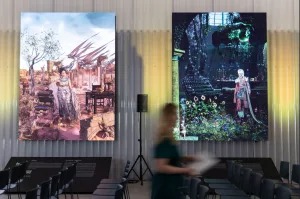On April 25, IE University had the privilege of hosting Michael Sandel, a renowned American political philosopher and professor of government theory at Harvard Law School. The dean of IE Law School, Soledad Atienza, opened the conference. She explained that the school’s main goal is to form legal practitioners that represent law values such as justice and rule of law.
The subject of the conference was “Reimagining Justice.” Sandel defined justice as the right way to value things and explained that it is more than distributing things the right way. To start his talk, he asked the audience a question: “What does a just society consist of?”
The impacts of communication and societal organization
Sandel emphasized the importance of the discourse method and how communicating and employing one’s ability to use words is the way to reach agreements. He explained that a just society is one in which people organize themselves to ask questions. Sandel went on to question whether meritocracy is the best way to organize societies in order to achieve this. In a meritocracy, people get a certain status or compensation based on their achievements and merit. This means that good things are not distributed on the basis of nepotism or corruption. In other words, in this scenario, the chances are equal for everyone.
Questioning our current understanding of communication and values
Sandel then began asking the audience a set of questions to see what their thoughts were regarding the communication of ideas. He then directed their thoughts to lead to one common understanding. Other questions posed by Sandel during the conference surrounded the idea of whether values are merely subjective. How deserving are individuals of their status in today’s society? For example, how does Cristiano Ronaldo’s salary compare to a high school teacher? Is it fair for him to earn so much money when a teacher is in charge of educating future generations?
In response to these questions, students in the audience answered that this is just how society works today. One possible explanation may be market forces, how demand for Cristiano Ronaldo is much higher than for a high school teacher. This led the professor to clarify that there is a distinction between when someone should be recognized for a certain award and when someone is deserving of it. He concluded that the present system in society is not necessarily fair.
Q&A with the audience
Towards the end of the talk, Sandel was asked questions by students in a short Q&A. He was first questioned about multiculturalism by a student, who stated that “Multiculturalism is a handy scapegoat for democracy’s discontent” And later asked, “Is it possible to arrive at a shared notion of the common good in places like the United States?” Sandel answered that we would not know until we tried. He stated that we should not simply settle for tolerance when there is pluralism (pluralism refers to learning from differences).
Another student went on to share that a substantive understanding of justice is necessary to come to a compelling understanding of the common good. He asked, “Is it possible to arrive at a planet-wide understanding of the common good?” Sandel explained that to a certain extent, we already have some shared values in terms of universal human rights. To reach a planet-wide understanding we must do what we can to listen.
For the third question, the Harvard law professor was asked by a student about artificial intelligence and human dignity. “Under what circumstances would AI still be respectful of the concept of human dignity?” and “Is justice still abatable through the use of AI?” the student inquired. A distinction was drawn between AI judges and those who are human. Human judges are more subjective, while algorithms do not have that problem and may instead be too rigid.
Concluding remarks
To finish off, Michael Sandel highlighted what is most important in a law school. Law schools must cultivate an environment in which individuals can reason together about hard, civic and ethical problems. Public discourse and moral reasoning are essential to reason about the competing conceptions that underlie today’s disagreements. Soledad Atienza described IE as having a soul, one that allows for this kind of reasoning from its students.
Featured image by: Gabriela Gorodi




